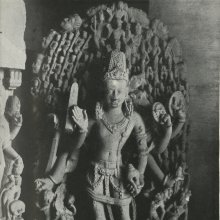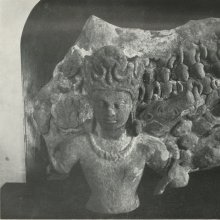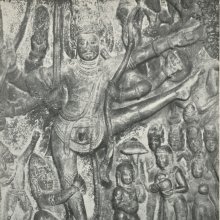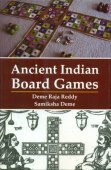India: 5 definitions
Introduction:
India means something in Hinduism, Sanskrit, Jainism, Prakrit, the history of ancient India, biology. If you want to know the exact meaning, history, etymology or English translation of this term then check out the descriptions on this page. Add your comment or reference to a book if you want to contribute to this summary article.
Images (photo gallery)
(+153 more images available)
In Hinduism
General definition (in Hinduism)
Source: archive.org: The Caraka Samhita (h)India was a nation of scholars in old days as the west is a nation of scholars at present. The forest Ashramas (dwellings) gradually grew to be the centres of the highest Aryan learning. Though deeply absorbed in, metaphysical studies, the Rishis’ experience of worldly life won them high reputation as teachers for the younger generation. [...] The Vedic Rishis not only composed hymns and performed sacrifices but fought their wars and ploughed their fields. Their martial spirit was for a long time kept alive by the necessity of holding their own against the enemy. The mild climate and fertile soil of the country bringing the means of subsistence within easy reach made the struggle for existence in India an easy one. Besides the lofty mountains and the seas shutting the country off for a long time from outside influences gave the Indian culture a unique character. The peculiar environmental conditions of India have tended to make her people more meditative and philosophical.
In Jainism
General definition (in Jainism)
Source: University of Cambridge: JainismIndia (इन्दिअ) in Prakrit refers to “senses” and represents one of the twenty-four Daṇḍakas (“parameters relating to the description of living beings”).—The most common list of daṇḍakas has 24 terms in Prakrit. This has been the starting point of a variety of works, among which the Caturviṃśatidaṇḍaka by Gajasāra stands as a classic.

Jainism is an Indian religion of Dharma whose doctrine revolves around harmlessness (ahimsa) towards every living being. The two major branches (Digambara and Svetambara) of Jainism stimulate self-control (or, shramana, ‘self-reliance’) and spiritual development through a path of peace for the soul to progess to the ultimate goal.
India history and geography
Source: archive.org: Personal and geographical names in the Gupta inscriptionsIndia.—The word ‘India’ is derived from the river Sindhu or the Indus. Sindhu is the name of a river mentioned in the Gupta inscription No. 20. The Gupta empire (r. 3rd-century CE), founded by Śrī Gupta, covered much of ancient India and embraced the Dharmic religions such as Hinduism, Buddhism and Jainism.
Source: Ancient Buddhist Texts: Geography of Early BuddhismIndia (at the time of the Buddha) was divided into small independent kingdoms. Of these kingdoms Magadha under Bimbisāra and Ajātasattu, Kosala under Pasenadi, Avanti under Pajjota, and Kosambī under Udena, played important roles in the political drama of India in the sixth and fifth centuries B.C.

The history of India traces the identification of countries, villages, towns and other regions of India, as well as mythology, zoology, royal dynasties, rulers, tribes, local festivities and traditions and regional languages. Ancient India enjoyed religious freedom and encourages the path of Dharma, a concept common to Buddhism, Hinduism, and Jainism.
Biology (plants and animals)
Source: Google Books: CRC World Dictionary (Regional names)India in Colombia is the name of a plant defined with Panicum maximum in various botanical sources. This page contains potential references in Ayurveda, modern medicine, and other folk traditions or local practices It has the synonym also an account of Sumatra, in a series of letters. London 1814. See [Benjamin Heyne], An Examination of so much of the Tracts, historical and statistical, on India, etc. by B.H. … as relates to the accounts of Sumatra, with various notices on the subjects of Cannibalism, Slavery, etc. By an inhabitant of Fort Marlborough. London 1818 (among others).
Example references for further research on medicinal uses or toxicity (see latin names for full list):
· Brittonia (1971)
· Elenchus Plantarum (1816)
· Journal of Economic and Taxonomic Botany (1985)
· Biologia Plantarum (1994)
· Mém. ORSTOM (1975)
· Synopseos Plantarum (1805)
If you are looking for specific details regarding India, for example side effects, chemical composition, pregnancy safety, health benefits, extract dosage, diet and recipes, have a look at these references.

This sections includes definitions from the five kingdoms of living things: Animals, Plants, Fungi, Protists and Monera. It will include both the official binomial nomenclature (scientific names usually in Latin) as well as regional spellings and variants.
See also (Relevant definitions)
Starts with (+198): India coral bean, India date, India eggplant, India oil-fruit, India polyscias, India rubber, India rubber fig, India rubber plant, India rubber tree, India sandbur, India trumpet flower, India-rubber-mara, Indiaansche vij, Indiaanse turksvy, Indian, Indian abutilon, Indian acalypha, Indian aconite, Indian aconite root, Indian acrocephalus.
Ends with (+15): Bael fruit of india, Bead tree of india, Bhavimdia, Central India, Coqueiro da india, Curse of india, Damtimdia, Davvimdia, Dedalu india, Eastern India, Ficodindia, Hierba india, Himdia, Jobo de la india, Markingnut tree of india, Nimdia, Nogal de la india, Northern India, Nowara hindia, Pride of india.
Full-text (+9901): Bharatavarsha, Khasa, Godavari, Cola, Magadha, Dandaka, Sindhu, Almendro de indias, Kaveri, Pepino de las indias, Shalivahana, Arbol de indias, Shuktimat, Mahendra, Trigo de indias, Narabhu, Malaya, Gaya, Ashoka, Shaka.
Relevant text
Search found 364 books and stories containing India; (plurals include: Indias). You can also click to the full overview containing English textual excerpts. Below are direct links for the most relevant articles:
The Butler Report < [May-June, 1929]
'The Triple Stream' < [October 1938]
Current Topics < [March-April 1931]
Sripura (Archaeological Survey) (by Bikash Chandra Pradhan)
Sripura City Planning < [Chapter 2 - The Architectural Panorama]
Meaning and Significance of the Nomenclature < [Chapter 1 - Sripura]
Archaeology: An Introduction < [Chapter 1 - Sripura]
History of Indian Medicine (and Ayurveda) (by Shree Gulabkunverba Ayurvedic Society)
Chapter 6 - The Story of Caraka < [Part 1 - The History of Medicine in India]
Chapter 1 - The history of Medicine in India (Introduction) < [Part 1 - The History of Medicine in India]
Chapter 1 - Universal Education in Ancient India < [Part 2-3 - Medical Institutions in Ancient India]
Settlement in Early Historic Ganga Plain (by Chirantani Das)
Part 2 - Buildings of Rājagṛha < [Chapter II - Origin and Function of Rājagṛha as the seat of Monarchy]
Part 3 - Related works on our settlement zones < [Introduction]
Kavyamimamsa of Rajasekhara (Study) (by Debabrata Barai)
Appendix 2 - Identification of Geographical names mentioned in the Kāvyamīmāṃsā
Part 8 - Rājaśekhara’s divisions of Geographical regions and Seasons < [Chapter 5 - Analyasis and Interpretations of the Kāvyamīmāṃsā]
Part 8.5 - Region of Dakṣiṇāpatha (southern part) < [Chapter 5 - Analyasis and Interpretations of the Kāvyamīmāṃsā]
Related products
(+92 more products available)










